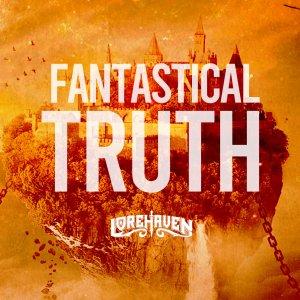Fantastical Truth

88. Can We Positively Engage Culture in a Negative World? | with Bethel McGrew, aka Esther O'Reilly
Christians love engaging fantastical worlds, right down to the real world Jesus calls us to serve. But what kind of world do we truly engage? Do we live in an amazing “positive world,” where most people think Christianity is great? Or do we live in a world that’s neutral toward Christianity—or even a world where most people despise our faith? Our answer helps us stay realistic yet optimistic about how we best engage stories in the real world. Today’s special guest, a recently unmasked “superhero” from the intellectual light web, joins our quest.
Subscribe to Lorehaven
articles • library • reviews • podcast • webzine • store
Episode sponsors
Episode links
- L. G. McCary’s That Pale Host update—and get the book’s first edition this month!
- Aaron Renn’s “Welcome to the Negative World: Why We Need American Reformer“
- Author Michael O’Brien’s Catholic end-times novels series: Children of the Last Days
- “Wokal Distance” on Twitter about contemporary young people’s real challenges to Christianity

Bethel McGrew arrives via DeLorean
Bethel McGrew (pen name Esther O’Reilly) holds a Ph.D. in mathematics, although she prefers not to call herself a mathematician. By day, she teaches algebra to high-school students. By night, she’s a widely published freelance writer and social critic, with words in outlets like The Spectator, First Things, The American Conservative, Plough, and more. She engages the “intellectual light web” on Twitter @EstherOfReilly and she’s also a repeat guest on the Unbelievable? radio show, where she’s engaged popular atheist figures like James Lindsay and Douglas Murray. She maintains a Substack, Further Up, and occasionally updates her Patheos blog, Young Fogey.
Concession stand
- This episode will touch on political issues. We know “political” just = “public.”
- Like our other popular culture–based episodes, this one is more foundational.
- We might mess with basically everybody’s assumptions, including our own.
- We’re assuming (not defending) some ideas, like the gospel and missions.
- We may assume labels like “woke” to mean a systemic religious-like system.
- Not every “anti-woke” person is Christian. But some are, including our guest.
- We’re also bouncing off this article that asks what kind of world we live in.
From “Welcome to the Negative World: Why We Need American Reformer“
In recent decades, the church has passed through three eras or worlds in terms of how American society perceives and relates to the church. These are the positive, neutral, and negative worlds, with the names referring to the way society views Christianity.
- Positive World (Pre-1994). Christianity was viewed positively by society and Christian morality was still normative. To be seen as a religious person and one who exemplifies traditional Christian norms was a social positive. Christianity was a status enhancer. In some cases, failure to embrace Christian norms hurt you.
- Neutral World (1994-2014). Christianity is seen as a socially neutral attribute. It no longer had dominant status in society, but to be seen as a religious person was not a knock either. It was more like a personal affectation or hobby. Christian moral norms retained residual force.
- Negative World (2014-). In this world, being a Christian is now a social negative, especially in high status positions. Christianity in many ways is seen as undermining the social good. Christian morality is expressly repudiated.
This is a heuristic framework or tool to help us make sense of the world we are in. It should not be seen as covering every circumstance or nuance of society or the church. But it captures something important about what has happened in recent years.
How has the church adapted to these changes? Each of these worlds has had a characteristic response or strategy by the Evangelical Protestant church.
Chapter 1: How have we engaged culture in a positive world?
- Some Christians assumed ideas about “moral majorities” and such-like.
- These positive, neutral, and negative worlds can overlap in shared times.
- For example, some of academia can be neutral toward Christian expression.
- Meanwhile, some subcultures (such as states and cities) can be very positive.
- We can benefit some by assuming the best of our neighbors’ views of faith.
Chapter 2: How did Christians engage culture in a “neutral world”?
- Some Christians grew up, reacted, and chose to “engage culture,” neutrally.
- Today some of these folks inhabit academia or professional ministry circles.
- Some people remain “neutral” and it’s helpful to discern/engage as such.
- Some apologetics debunks “moral relativism,” but do people really believe this?
- Previous Christian materials often tried to “find the gospel” in secular stories.
Chapter 3: If this is “negative world,” what does this change for us?
- Examples: not just politics but porn and Sexualityism/Identityism in schools.
- Some Christians say, “Just create excellent stories and the world will take notice.”
- But that’s no longer true. Secular storytellers are expected to uphold false religions.
- At Lorehaven, we support all great Christian-made fantastical stories, for any “world.”
- Still, we want to cultivate desires for more stories that help us engage our negative world.
Epilogue: Fantastic fans
Caleb replied about our last episode about Dune and other fandoms:
I’m so glad you guys finally discovered Dune. I’ve been a fan of the film since the 80s. Reread the first book at least once but never finished the series. This was a great episode!
When you started talking about non-Christian authored fandoms with Christian themes, I was certain that you would read my letter from September about Orson Scott Card, as it was closely on this theme.
Keep up the good work!
Caleb’s letter from September about Orson Scott Card:
I am wondering if you have read [Orson Scott Card’s] novels or the novels of Christian adjacent world views (aka Mormon). In particular, I wonder if you have an opinion about the Alvin Maker series and what fantastical truths it reveals? I was very intrigued by the themes of how Makers are the light that fights back the darkness of the Unmaker.
Next on Fantastical Truth
We’ve hinted at it. You’ve asked about it. Now we’re finally doing that Harry Potter episode, a first one anyway, timed very closely with the 20-year anniversary of the first film’s release, Harry Potter and the Sorcerer’s—excuse me—The Philosopher’s Stone. Another fan of the Potterverse will join us to explore the Wizarding World decades after its creative conjuring: the pros, the cons, and of course a little bit about that controversial magic.






 Visit Podcast Website
Visit Podcast Website RSS Podcast Feed
RSS Podcast Feed Subscribe
Subscribe
 Add to MyCast
Add to MyCast